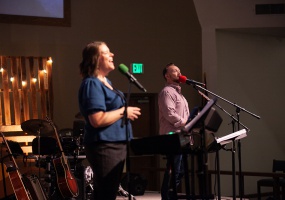To Fear Or Not To Fear Part 3: Conclusion
by pastor Andy Lauer
Each of these devotional blogs entries is meant to be read on your own or if you have family or friends you live with, to be read together aloud. A suggestion is to do this after you have dinner around the table together. At the conclusion, please spend time in personal reflection or in sharing with one another your answers to the questions at the end. Be sure to conclude with prayer.
Read Psalm 111
The fear of the LORD is the beginning of wisdom. All those who practice it have a good understanding. (Psalm 111:10 ESV)
Many years ago, when I was still in college, I drove a Burgundy Isuzu Trooper SUV. I loved it for many reasons. I loved it for the spartan, no-frills interior (read: no power anything), the 5-speed manual 4-wheel drive, the space to transport my mountain bike and camping gear in the back, and because it was the first vehicle I owned. While I didn’t do a lot of customization to it, I did apply a decal on the back window, popular at the time, which said, “Fear God.”
One day, as I was waiting for red light to change, I heard a knock on my side window and saw the face of a teenage girl. As soon as I cranked down my window, she blurted out: “Why should we fear God? Doesn’t God love us?” I was quick with my answer, “Fearing God doesn’t mean to be afraid, it means to be in reverence or in awe.” As the light quickly changed, she returned to her car and we both drove off into the Ohio sunset, or something like that.
I share that story for two reasons. First, the Bible clearly states that we are to fear God and people want and need to know what that means. But second, because my answer to that high school student was only partly right. I’ve grown in my understanding since then, and I’d like to share with you.
The Bible speaks frequently of fearing God, especially the books of the Proverbs and the Psalms. Fearing someone we love and who loves us is a foreign concept for most of us. It’s grates on the ears, actually, like fingernails on a chalkboard. Why would/should I fear a loving God? That doesn’t make sense. There must be some other explanation. Actually, there’s not.
The Hebrew words for fearing God in many places perfectly match our common understanding of what fear is. Some of them includ “afraid” (yare), “terror” (charadah), and “dread” (pachad). The Hebrew word for “fear” in Psalm 111:10 quoted above is yirah which means “terrifying.” In other words, there’s no explaining away the “fear of the LORD” as meaning only reverence and awe. (There are other Hebrew words for “reverence” and “awe,” but they are not used in many of the places that we have translated “fear”.) So, what are we to make of this?
One of the best methods of Biblical interpretation is to let the Bible interpret the Bible. This means that we should first look at what does the Bible itself say about its own teachings and claims rather than going to a commentary or other interpretive writing. If we follow that approach, we discover something very revealing and enlightening about trembling in fear before God.
“The fear of the LORD is the beginning of wisdom.” (Proverbs 1:7)
“The fear of the LORD is the beginnning of life, that one may turn away from the snares of death.” (Proverbs 14:27)
“Teach me your way, O LORD, that I may walk in your truth; unite my heart to fear your name.” (Psalm 86:11)
“ The fear of the LORD is clean, enduring forever; the rules of the LORD are true, and righteous, altogether.” (Psalm 19:9)
“The friendship of the LORD is for those who fear him, and he makes known to them his covenant.” (Psalm 25:14)
What we notice when we read these passages is that the understanding of “fear the LORD” is much richer when we don’t try to explain it away. To literally fear the LORD is to recognize Him as He truly is: a Being of infinite power, perfect holiness, flawless purity, complete justness. A Being in whose holy presence we simply could not stand and live. A Being who, as Jesus says, can “destroy both the body and soul in hell” (Matthew 10:28). We should NOT view God as anything less than the most omnipotent, fearsome, awe-full being of all. Our very life depends on Him. The universe exists or ceases to exist at His pleasure. He is NOT to be trifled with.
But, but, but . . . that is, as the Psalms and Proverbs remind us, just the beginning of wisdom; it is the starting point. In fact, what the Bible teaches us is that to rightly understand and recognize God as He truly is, actually leads to life and health and peace and truth . . . and even salvation!
You see, although God is rightly to be feared, just as we would fear anything that has the potential to kill us—lightining, gizzly bears, the Coronavirus—God also has revealed himself not only to be infinitely, omnipotently dangerous, but also infinitely loving! The Apostle John declares,
“God is love. This is how God showed his love among us; He sent his one and only Son into the world that we might live through him. This is love: not that we loved God, but that he loved us and sent his Son as an atoning sacrifice for our sins . . . This is how love is made complete among us so that we will have confidence on the day of judgment . . . there is no fear in love. But perfect love drives our fear, because fear has to do with punishment” (1 John 4:8-10, 17-18).
The Apostle Paul tells us, “for the wages of sin is death, but the free gift of God is eternal life through Jesus Christ our Lord” (Romans 3:23). The One who could turn the cosmos into crumbs is the same One who saves us from sin and destruction.
My friends, the beginning of wisdom is the fear of the Lord, but it is not the end. We start there, recognizing that every single aspect of our life depends on Him and that before Him our sinful selves deserve nothing but utter destruction. We begin knowing that living our lives in opposition to Him is like driving headlong toward the precipice of a volcano. But, we don’t stay there. We move on to the truth that living our lives in obedience to Him, that accepting the gift He freely offers of eternal salvation through Jesus Christ, that aligning ourselves and availing ourselves of the life-giving wisdom of His teaching and commandments as contained in Scripture, is to discover the truly incomprehensible temporal and eternal blessings that come from moving in step with His will and His way. In other words, God has made a way through His Son for us to have a relationship with Him, not based entirely on fear, but based on His love and the confidence that salvation through Jesus Christ leads us from fear to love and obedience.
So, to fear or not to fear? In the end, the answer depends, but Scripture is always faithful to guide us correctly, if we will listen.
Spend some time in prayer with someone else or on your own.
Reflect with someone else or on your own:
- How has your understanding of fear changed as you’ve engaged with the Bible’s teaching on it?
- In what way does the Biblical way of fearing the Lord help you in your walk with Jesus?
- Consider what might change in your life as a result of really starting to “fear the Lord” while at the same time recognizing that when we accept Jesus and follow Him, we don’t need to fear punishment or judgment from God.
























